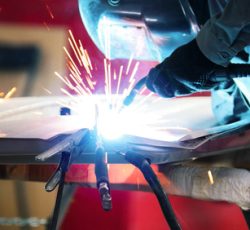 Welding is a crucial process in many industries, such as manufacturing, construction, and shipbuilding. It involves applying heat to join metals, but it also poses various hazards for the welder and those in the vicinity. Therefore, understanding and implementing welding safety practices are of utmost importance. In this blog post, we will discuss the significance of welding safety and highlight some essential tips and best practices to ensure a safe working environment.
Welding is a crucial process in many industries, such as manufacturing, construction, and shipbuilding. It involves applying heat to join metals, but it also poses various hazards for the welder and those in the vicinity. Therefore, understanding and implementing welding safety practices are of utmost importance. In this blog post, we will discuss the significance of welding safety and highlight some essential tips and best practices to ensure a safe working environment.
Understanding the Hazards
Before delving into safety tips and best practices, it is essential to understand the hazards associated with welding. Welders face multiple risks due to the nature of their work. The most common hazards include exposure to hazardous fumes and gases, intense heat and light radiation, electrical shock, fire, and explosion. These hazards can cause severe injuries, respiratory problems, burns, and even long-term health issues.
Personal Protective Equipment (PPE)
Personal protective equipment is a crucial aspect of welding safety. It provides a physical barrier and helps safeguard against many hazards. Welders should ensure they are equipped with the necessary PPE before starting any welding operation. This includes wearing a welding helmet with the appropriate shade lens to protect the eyes from intense light radiation. Welding gloves, safety glasses or goggles, and flame-resistant clothing are also essential to protect against burns, sparks, and flying debris. Additionally, respiratory protection in the form of a respirator or a proper ventilation system must be used to prevent inhalation of hazardous fumes and gases.
Proper Ventilation
Welding generates various hazardous substances, including metal fumes, gases, and vapors. These substances can be detrimental to the welder’s health if inhaled over an extended period. Implementing proper ventilation practices is crucial to ensure the removal of these harmful substances from the work area. This can be achieved by utilizing local exhaust ventilation (LEV) systems such as fume hoods or exhaust fans. Adequate ventilation helps maintain a clean and safe working environment, reducing the risk of respiratory problems.
Fire Safety
Welding involves working with intense heat and sparks, which significantly increase the risk of fire. Therefore, fire safety precautions must be taken seriously to prevent workplace accidents. Before starting any welding operation, it is essential to remove any flammable materials from the work area. The use of fire-resistant or non-combustible covering on nearby surfaces can further minimize the risk of fire. Additionally, having fire extinguishers readily available and ensuring all employees are trained in their proper usage is crucial for immediate response to any potential fires.
Electrical Safety
Welding equipment operates on high currents and voltages, making electrical safety a significant concern. Welders must ensure that their equipment is adequately grounded to prevent electric shock injuries. Regular inspection of welding cables, connectors, and insulation is crucial to identify any potential electrical hazards. Moreover, welding near flammable materials or in wet conditions should be strictly avoided to prevent electrical accidents. Employers should also provide sufficient training and ensure compliance with electrical safety regulations to mitigate the risks associated with welding operations.
Safe Handling of Compressed Gas Cylinders
Compressed gas cylinders are commonly used in welding operations for shielding gases or fuel gases. Mishandling these cylinders can lead to explosions or severe injuries. Therefore, it is crucial to follow safe handling practices when working with compressed gas cylinders. Proper storage and securing of cylinders, ensuring appropriate valve protection caps are in place, and not subjecting cylinders to extreme heat or physical impact are essential precautions to minimize the risks. Employers should also conduct periodic inspections and provide training to employees regarding the safe handling and storage of compressed gas cylinders.
Summary
Welding safety is of utmost importance to ensure the well-being of welders and maintain a safe working environment. Understanding the hazards associated with welding and implementing proper safety practices are essential to prevent injuries, exposure to harmful substances, and accidents. By using appropriate personal protective equipment, ensuring proper ventilation, practicing fire safety, following electrical safety guidelines, and handling compressed gas cylinders with care, welders can reduce the risks and create a safe working environment. Remember, welding safety should never be compromised, and following the best practices is crucial to achieving a successful and accident-free welding operation.
Need a Machine Shop in Atmore, AL?
Escofab Inc. has been dedicated to providing quality machining and fabrication since 1981! Here at Escofab Inc. we utilize fabricating and machining to your specifications. We work to fit your needs and ensure customer satisfaction. Our friendly and informative staff are eager to assist you! Give us a call or come on in today; walk-ins welcome!
